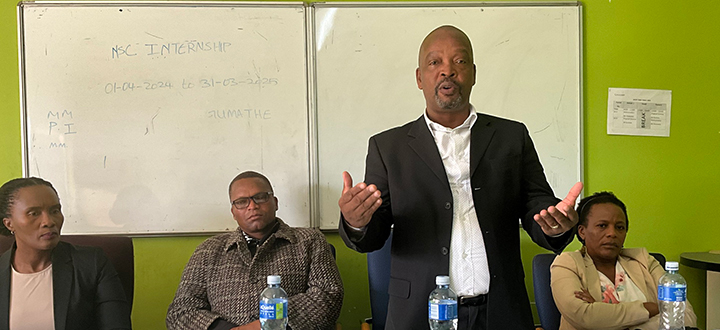News & Media
Storytelling and African Futures, Reflections on Africa Month

Prof Puleng LenkaBula
* By Prof Puleng LenkaBula, Unisa Principal and Vice-Chancellor
During Africa Month, Africans and those who love this continent and its people gather to celebrate what it means to be African, to stretch what it means to be African, to jettison those things that limit possibility and to reflect on the meaning of freedom, so much of which was won through great struggle. Africa Month gives all of us a chance to pause and consider the connections between the hopes of the past and the disappointments of the present. The struggles continue to this day, because freedom is both beautiful and elusive. I have been inspired by the writings of young women of African descent, whose works add to the rich tapestry of voices that create new worlds from which we can reimagine our societies. Thus, in honour of Africa Month, I was honoured to share these voices, for theirs are the voices that bring to us a progressive vision and remind us why women creators matter so much.
These younger, newer writers do not replace the older writers whose works captured the imagination of earlier generations. Their work centres the African experience in ways that were simply impossible for earlier writers who had to contend with the dominance of the colonial world view. But both sets of writers remind us that the personal, the political and the imaginative will always be inextricably tied. One of the things that emerge from considering the power of these new literary voices is that complexity is at the core of much of our exploration of identity, aspiration and storytelling.
It is Yaa Gyasi, author of Homegoing and Transcendent Kingdom who reminds us, in her reflections on writing history: "We believe the one who has the power. He is the one who gets to write the story. So when you study history, you must always ask yourself, Whose story am I missing? Whose voice was suppressed so that this voice could come forth? Once you have figured that out, you must find that story, too. From there, you begin to get a clearer, yet still imperfect, picture." Literature gives us a way by which women’s lives can be showcased and reimagined outside the limiting constructs of patriarchy and tradition.
Maaza Mengiste, a writer of dazzling talent, is the author of the novels Beneath the Lion's Gaze and The Shadow King. In The Shadow King, Mengiste forces us to pay attention to those who have been relegated to the margins of history. The women warriors, whose voices and contributions have been rendered invisible and silent, are brought to the fore. In this way, Mengiste asks us to consider how, in the many stories of liberation across the African continent the women have been sidelined, forgotten, and the heroes brought to the fore are mostly men. But we know this is not true, and whether it is in South Africa, in Nigeria, in Kenya or in Ethiopia, women rose against colonial authorities and they rose too against liberation governments. And they continue to lend their voices to the cause for the new freedoms for which the new generations yearn.
"She can hear the dead growing louder: We must be heard. We must be remembered. We must be known. We will not rest until we have been mourned. She opens the box."
"For me, it was symbolic of the way that we all have a responsibility to reclaim our dead, to remember them and speak of them in such a way that we understand the kind of future that they were working towards; that they were fighting for," Mengiste adds so powerfully
The path towards freedom is never a simple one. Where others may simply yearn for political freedom, they soon learn that all freedoms are linked, and freedom must be imagined in its widest, most expansive version.
Naledi Mashishi, the young South African writer brings a story that dares to explore the world of false prophets. Her novel, The Invisible Strings melds both the past and the present, the living and the dead, and Apartheid South Africa and present day South Africa collide in ways that show that the past is always with us, and it profoundly affects how we negotiate our way to the imagined future. I was struck by the similarity between the charismatic, false prophets, and the way they prey on their communities, and the way popular, deeply charismatic politicians have sold their communities so much false hope. There is something eerily powerful about the title of the novel, because it is the invisible strings that tie the lives of the desperately poor in Alex, and the offensively affluent in Sandton. Those who have grabbed the lion's share of the spoils of freedom hide their greed behind a veil of smooth sounding slogans that grow emptier by the day.
Bolu Babalola brings us stories of love, but she does much more than that, she shows us that love is one of the most complex of human emotions. In her collection of short stories, Babalola explores a world that stretches from the North of Africa to the Southern tip. Many of the stories she tells are about marginalized women, those whose lives are tucked away at the edge of society. Babalola enters their own idea of what it means to love, to be loved, and to been seen. She also asks us to consider whose myths are worth holding onto, telling and retelling. Her book, Love in Color is a collection of 13 short stories. Most of them engage in the art of retelling. From Lesotho’s Naleli, to Greece’s Psyche and Eros, these stories show that love has always been at once personal, but also always in some ways political.
Babalola says. "What we know is so Western and white. And in these stories, I'm centering women of color—mostly Black women—and exploring stories that aren't just about struggle and pain, but of joy, love, and connection."
As I said earlier, this generation of younger writers in many ways have picked up the baton from their literary forebears. In their works you hear the whispers of Toni Morrison, strands of Alice Walker, of Miriam Tlali, of Mariama Ba, of Bessie Head, of Nina Simone, of Miriam Makeba, of Buchi Emecheti, of Nikki Giovanni and many others. But there is also the interconnectedness with the works of feminists from beyond the diaspora, the voices of Susan Sontag, of Joni Mitchel, of Audre Lorde and of Adrienne Rich. In her poem, Diving Into the Wreck, Adrienne Rich writes:
I am here, the mermaid whose dark hair
streams black, the merman in his armored body
We circle silently about the wreck
we dive into the hold. ...
We are, I am, you are
by cowardice or courage
the one who find our way
back to the scene
carrying a knife, a camera
a book of myths
in which
our names do not appear.
First published in 1973, this poem is concerned with absence, with the absence of the names of women from the book of myths. Nearly half a century later, a new generation of writers is writing into the literary body the lives and stories of women whose lives were once left at the margins of history. And so, as we celebrate every Africa Month, and toast each other on every Africa Day, we should take the time to read and re-read the stories that centre women’s experience, that dare imagine how storytelling can provide the spark for a change in social institutions. The words of Adrienne Rich capture this eloquently: "Poetry is not a healing lotion, an emotional massage, a kind of linguistic aromatherapy," she said in an address to the National Book Foundation in 2006, on receiving its medal for distinguished contribution to American letters. "Neither is it a blueprint, nor an instruction manual, nor a billboard."
Those who dare rise up against what they see as injustice, what they experience as a stifling of their freedom, as a betrayal of their hopes, as a dashing of their deepest yearnings often take to song, to the pen to give us a glimpse of worlds in which freedom reigns. These storytellers do not merely contend with the limitations of the structures that restrict the lives of women, they explode them. Storytellers are here to give us new ways of seeing, they are also here to remind us that the identity of those who get to tell stories is important. As a new generation of storytellers capture our imagination, they wrestle with the lives of those that had been consigned to the margins of history. They render their lives visible and, in this way, remind us that Africans have richly layered lives. And it is this richness that we need to celebrate every Africa Month and Africa Day.
Publish date: 2021-05-31 00:00:00.0

 Unisa remains anchored among the waves
Unisa remains anchored among the waves
 Inhlanyelo Hub explores sustainable tourism initiatives in Marico Biosphere Reserve
Inhlanyelo Hub explores sustainable tourism initiatives in Marico Biosphere Reserve
 Unisa KZN Region explores extending university services to KwaMpungose community
Unisa KZN Region explores extending university services to KwaMpungose community
 Unisa's catalytic niche areas provide industry-focused mining innovations
Unisa's catalytic niche areas provide industry-focused mining innovations